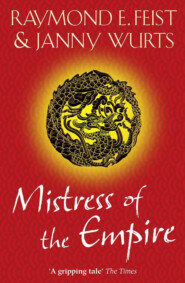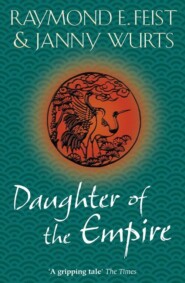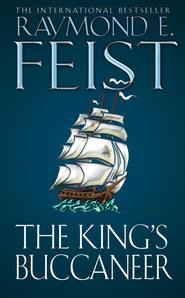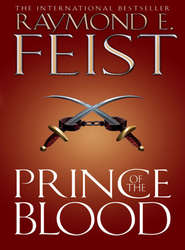По всем вопросам обращайтесь на: info@litportal.ru
(©) 2003-2025.
✖
The Complete Legends of the Riftwar Trilogy: Honoured Enemy, Murder in Lamut, Jimmy the Hand
Автор
Год написания книги
2018
Настройки чтения
Размер шрифта
Высота строк
Поля
Asayaga shook his head. No. Something was dreadfully wrong with this entire situation. He looked over at Sugama but knew there would be no sage advice. He was, after all, of House Tondora, allegedly assigned to Asayaga’s force for training in anticipation of the Tondora joining the Warlord’s host in the spring. It was an unusual but not unprecedented situation to have a junior officer train with the forces of an ally, but everyone knew that this was simply a charade. The Tondora – while publicly ‘politically neutral’, in the Great Council – were Clan Shonshoni and a client House of the Minwanabi, so everything they did was at Minwanabi bidding.
Though supposedly second-in-command, his bloodline and rank in the courts at home would have placed him far above what Asayaga could ever hope to aspire to. So there could only be one reason he was in a subordinate role now: to keep close watch on Asayaga. Asayaga was a son of the Kodeko, a minor house, but of Clan Kanazawai, and the Shinzawai were most likely next on the list of opponents to be crushed by the Minwanabi. The Minwanabi were far too clever to openly confront House Keda, the most powerful Kanazawai Clan family, and one of the Five Great Families of the Empire. But the Shinzawai, while an old and honourable family, with a venerated lord in Kamatsu, retired abruptly from the war with the other families in the Blue Wheel Party, dealing the Warlord a major setback. The move had actually helped the Minwanabi cause, but had also marked the Shinzawai as a political force to be reckoned with. And the Minwanabi never ignored such potential opponents. By discrediting Clan Kanazawai, the Minwanabi would weaken the Keda and their allies. It was but another ploy in the Great Game.
Against that possibility, Asayaga of House Kodeko was ordered to remain in the war by the clan leaders. Ostensibly of the Yellow Flower Party – still allied with the Warlord – Asayaga was the logical choice to be left behind to keep an eye on the Minwanabi. Someone had to be, for their plots and schemes were unending.
Asayaga recalled the disgust he had felt when word of the loss of Lord Sezu of the Acoma had reached him; while of Clan Hadama, Lord Sezu was nevertheless an honourable man worthy of respect. His death had been the result of a manipulation of the Minwanabi sub-commander, who had reinforcements arrive ‘too late’ to save Sezu and his son Lanakota from death. Now only Mara, his daughter, was left to shepherd her house, though by rumours reaching the front, she seemed adept at doing so.
Asayaga kept his disquiet to himself; this late arrival smacked of the same sort of machinations as that betrayal of Sezu in the first year of the war, and that made him uneasy. Fighting the soldiers of the Kingdom was one thing, and even facing the Forest Demons, those known as Dark Brothers to the enemy, was simple warfare. But the treachery of the Great Game, reaching as it did through the rift from the home world to this distant and icy frontier, that was an enemy impossible to confront directly. Besides, even back home Asayaga never liked politics. He took after his father in that regard, and it was for that reason above all others why the Kodeko had remained a minor house in Clan Kanazawai.
Asayaga’s gaze drifted to his senior Strike Leader, Tasemu, the true second-in-command, a veteran from the very start of the war. The one-eyed fighter nodded his understanding that they needed to talk in private, then motioned for them to pull back.
Sugama saw the interplay and cleared his throat. ‘We must find out what happened, Force Commander. Perhaps both sides annihilated each other. We can take the fort now and hold it, gaining great glory. Think of what would be said if this kingdom fort was indeed abandoned and then we simply ran away. If we miss this opportunity the disgrace will be known throughout the army.’
And you would be certain to spread it, Asayaga thought. For that matter Sugama, by that mere statement, had forced his hand. The comment had been made as friendly advice, and if ignored, Sugama would be seen to have been in the right and have won his point in the Game. It was impossible now to withdraw without first sending someone up to the fort and thereby reveal his presence.
Asayaga silently cursed. He looked back at Tasemu who stared back impassively.
‘What are you thinking, Strike Leader?’ Asayaga asked.
The mere fact that a Force Commander asked a Strike Leader for an opinion obviously shocked Sugama; but, no matter which clan he belonged to, he had to learn to leave Tsurani rigidity behind if he was going to fight with Force Commander Asayaga. This was war on an alien world and you didn’t live long if you held to forms and customs.
‘A third force did this,’ Tasemu announced.
‘Who?’
But Asayaga already knew the answer: the idea was half-formed within minutes of him first creeping up to the edge of the clearing.
‘The Forest Demons.’
‘Demons? Creatures of myth! Impossible!’ Sugama exclaimed.
‘They are mortal,’ Asayaga said, ‘but those here first called them demons because they are most difficult to close with. They drift among the trees like the mist, and they can strike without warning. The Kingdom call them “the Dark Brotherhood”. They are kin to those called “elves” we believe.’
Tasemu volunteered, ‘And they do fight like demons when they wish, Force Leader. They are … difficult.’
The mere mention of them had sent a shiver through more than one of Asayaga’s men. They were a strange, unknown factor on this world. Logic would have dictated that these creatures should have allied themselves with the Kingdom in order to repel a foreign invader, as had the elves and the short men called ‘dwarves’. Yet they obviously had not. They were often not seen for as long as a year, then suddenly a patrol would vanish or an outpost would be overrun; and when it was clear that the Kingdom had not had a hand, it was possible to conclude only one thing: it had been the Dark Brothers. This third player in the drama made every commander in the north uneasy, since the Forest Demons’ actions were impossible to anticipate.
Yet it was not their unpredictability that disturbed his men. They were soldiers and expected to die if needs be; that was their place in the order of things. Yes, the war against the Kingdom – especially here on the northern frontier – was deadly, the fighting brutal. Often there was no time to care for wounded, who were given the honourable death of the blade lest they be taken prisoner and shame their houses by being made slaves or, worse, being hanged as one would a criminal or slave.
But at least the Kingdom soldiers were men. They fought with an honour that Asayaga found he had initially been surprised by in barbarians. There had been an unspoken truce at the siege of Crydee, where Kamatsu of the Shinzawai, Asayaga’s cousin, had commanded. Both sides had calmly and silently collected their dead several times and had burned them on pyres of honour, before returning to their respective lines without incident, to resume the fighting the next day. The siege had ended with the withdrawal of the forces of the Blue Wheel Party.
Yet that siege had taught Asayaga what to expect from the Kingdom soldiers. With the Dark Brothers, however, the killing was different. More than once he had found bodies, Tsurani and Kingdom, butchered in horrible ways, the mutilation obviously done while the victim was still alive. Even the dead they disfigured: ears lopped off as trophies, heads placed on stakes. It was as if they loved to kill humans, and did so for the simple pleasure it gave them. And you could almost never see them coming. A superstition had come into being among the soldiers in the north, that if they died and were given funeral rites here on Midkemia, their spirits would be somehow sent back to their homeworld on Kelewan. But without speaking of it, the men had come to believe that should the Forest Demons butcher the dead and leave them for the carrion eaters, the spirits of the slaughtered Tsurani would wander this cold and alien landscape until the end of time. No priest of any order had been able to counter this belief. Asayaga, like every commander in the north, knew this superstition gave the Dark Brothers an advantage they scarcely needed.
He looked back at Sugama, hoping that Tasemu’s words had registered some doubt.
‘Shall I go to the fort, Force Commander, and lay claim to it?’ Sugama asked evenly, as if Tasemu’s words had merely been the whistling of the wind.
Asayaga was about to tell him to go to the devils of the underworld, but he held his tongue. He was trapped. A plan formed for a brief instant. He would order a retreat, hold Sugama back for a few minutes and slip a blade into his throat, thereby silencing him.
He knew his men would never ask what had become of Sugama when he caught up with them, but others back at the headquarters camp were not of House Kodeko, and they would almost certainly assume treachery if Sugama were the only casualty.
Send Sugama forward? No, damn it. If indeed the battle had been a mutual slaughter, or there was even the remote chance that the Kingdom troops had retreated after the fight, the shame of letting Sugama take the fort would be unbearable to his house. It would appear as well that he was a coward, ordering someone else to take the risk rather than set the proper example by doing it himself.
What was even more enraging was the realization that Sugama was following the same process of reasoning and thus dictating the rules of the game now being played.
Asayaga looked once more at Tasemu, but there was no need to say anything. Of the eighty men in his command most were new recruits; little more than boys called to serve by their blood ties to House Kodeko. They would obey without question, but they were untested. Asayaga would rely on his old core of twenty veterans, led by Tasemu, who knew the ways of this war. The Strike Leader nodded, raised a hand and gestured, Vashemi and Tarku, the most senior Patrol Leader and the wiliest old veteran without rank, respectively, half-stood and started back down the trail, checking to the rear as he went forward.
Asayaga shot a withering gaze at Sugama. ‘Stay here.’
Taking a deep breath, he stood up and stepped out of the forest and into the clearing. He strode forward, acting as if he was out for a morning walk along a road on his family’s estate, rather than advancing alone, fully exposed, heading towards a deserted, smoking ruin.
He passed the pile of bodies and as he drew closer he felt his heart constrict. All were dead, most from arrows, but the shafts had been snapped off by someone who wished to obscure the identity of the attackers. But the manner of death for some made it all too obvious. More than one of the warriors had been wounded first; but if it had been by Kingdom troops, the final dispatching would have been done with a certain professional respect for a worthy foe. A warrior from either side would often give the doomed a moment for final prayer and then cut his throat cleanly and quickly. He had done it often enough himself, both to Kingdom soldiers too injured to be taken back as slaves, and more than once to one of his own men whom he was forced to leave behind.
The dying had been murdered cruelly. Several had been decapitated. He slowed for a second, looking down at a face he vaguely recognized, an officer he had seen at times in camp. The mutilation was ghastly, the one most feared by any man. The agonized expression frozen on the dead man’s face was evidence enough that he had still been alive when the carving up had started.
Asayaga swallowed hard and kept going. The fort was now less than a hundred paces away: he was coming into easy arrowshot range. The gate was off its hinges, the inside of the compound visible, bodies littered the interior. Several vultures were perched on the expansive stomach of one of the dead.
Perhaps the fort was abandoned after all?
And yet …
He slowed. Something wasn’t right. The vultures, they weren’t eating, they had stopped and were looking not towards him but instead at something within the fort that he couldn’t see.
He stopped, and his hand went to the hilt of his sword.
Two things happened at nearly the same instant. The vultures, startled by something he couldn’t see inside the fort flapped their wings, croaking obscenely, struggling to lift into the air: and a shout of warning came from behind. It was Tasemu.
‘It’s a trap!’ Asayaga roared.
For the first few seconds he thought to rush the fort, but even as the vultures lifted off he knew someone was inside and if there was someone inside the smoking ruins of the barracks it meant there was most likely many of them, ready to hold the gate and riddle a charge with arrows.
He turned and sprinted back towards his men. Tasemu was standing out in the open, arms up, pointing back up the trail they had just come down.
‘Behind us!’ Tasemu cried, ‘The Forest Demons are coming!’
Asayaga stopped half-way between the fort and the edge of the clearing.
Damn them! We walked straight into it. It was clear what would happen. Already Sugama was ordering the men to rush the fort and take refuge.
No! That’s what the enemy want! They’ll block the gate: then we get caught in the open and shot full of arrows.
He had to think. He looked back at the fort. It had been but a dozen heartbeats since he had turned back from it. The vultures were barely clear of the gate, wings flapping. The shelter of it looked inviting: too inviting.
His men were streaming out of the woods, running hard, Sugama in the lead. Then one of the men, just barely out of the forest, collapsed, blood fountaining, an arrow driven through his throat.
Sugama came on quickly.
‘Hundreds of them!’ he shouted, his voice edged with panic.











